|
|
|
Sort Order |
|
|
|
Items / Page
|
|
|
|
|
|
|
| Srl | Item |
| 1 |
ID:
088363
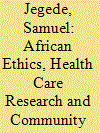

|
|
|
|
|
| Publication |
2009.
|
| Summary/Abstract |
This article discusses the appropriateness of western bioethics in the African setting. It focuses on the decision-making process regarding participation in health research as a contested boundary in international bioethics discourse. An ethnomethodological approach is used to explain African ethics, and African ethic is applied to the decision-making process in the African community. An HIV/AIDS surveillance project is used as a case study to explore the concept of communitarianism. The article argues that what exists in Africa is communal or social autonomy as opposed to individual autonomy in the West. As a result, applying the western concept of autonomy to research involving human subjects in the African context without adequate consideration for the important role of the community is inappropriate. It concludes that lack of adequate consideration for community participation in health research involving human subjects in Africa will prevent proper management and lack truly informed consent.
|
|
|
|
|
|
|
|
|
|
|
|
|
|
|
|
| 2 |
ID:
178925
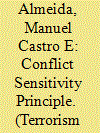

|
|
|
|
|
| Summary/Abstract |
This article explores how best practice in conflict research can address some of the key gaps and limitations of the terrorism research field with regards to research ethics. It draws from conflict research literature, as well as the authors’ primary research experience in Fragile and Conflict-Affected States (FCAS) and in the policy-oriented field of Preventing and Countering Violent Extremism (P/CVE). The analysis focuses on “conflict sensitivity” and the methodological approaches that have been developed and refined under the framework of that principle, including Systems Conflict Analysis. We seek to demonstrate how the integration of research methods related to conflict sensitivity represents an appropriate and fitting research agenda, through which relevant limitations of terrorism research can be addressed. This research agenda emphasizes, among other aspects, the need for solid primary research grounded in a detailed understanding of the local context, a departure from the narrow understanding of the Do No Harm principle in terrorism research, and a greater awareness about the relationship between research ethics and research methods.
|
|
|
|
|
|
|
|
|
|
|
|
|
|
|
|
| 3 |
ID:
112739
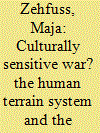

|
|
|
|
|
| Publication |
2012.
|
| Summary/Abstract |
Since around 2005, efforts have been made within the US military to highlight the significance of culture or the 'human terrain' for counterinsurgency operations. The US Army responded to the asserted 'cultural knowledge gap' by establishing an experimental programme called the Human Terrain System (HTS), which involves deploying social scientists alongside combat forces. While HTS was received favourably in the US mainstream media, it has been fiercely criticized by anthropologists in particular, who argue not least that participation in the programme would constitute a violation of their professional ethics, which require them to protect their research subjects. This article explores the anthropologists' critique and its limitations, arguing that it fails to tackle the problem of ethics deployed as a supposedly extra-political standard that can serve to (de)legitimize political projects. In particular, it is unable to dislodge the fantasy of protection at the heart of the argument for HTS.
|
|
|
|
|
|
|
|
|
|
|
|
|
|
|
|
| 4 |
ID:
178875


|
|
|
|
|
| Summary/Abstract |
This article explores our experiences of conducting feminist interpretive research on the British Army Reserves. The project, which examined the everyday work-Army-life balance challenges that reservists face, and the roles of their partners/spouses in enabling them to fulfil their military commitments, is an example of a potential contribution to the so-called ‘knowledge economy’, where publicly funded research has come to be seen as ‘functional’ for political, military, economic, and social advancement. As feminist interpretive researchers examining an institution that prizes masculinist and functionalist methodologies, instrumentalised knowledge production, and highly formalised ethics approval processes, we faced multiple challenges to how we were able to conduct our research, who we were able to access, and what we were able to say. We show how military assumptions about what constitutes proper ‘research’, bolstered by knowledge economy logics, reinforces gendered power relationships that keep hidden the significant roles women (in our case, the partners/spouses of reservists) play in state security. Accordingly, we argue that the functionalist and masculinist logics interpretive researchers face in the age of the knowledge economy help more in sustaining orthodox modes of knowledge production about militaries and security, and in reinforcing gendered power relations, than they do in advancing knowledge.
|
|
|
|
|
|
|
|
|
|
|
|
|
|
|
|
| 5 |
ID:
163176
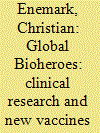

|
|
|
|
|
| Summary/Abstract |
In the pursuit of ‘global health security’, some governments advocate deployment of pharmaceuticals to combat deadly infectious diseases wherever they emerge. Following the Ebola outbreak in West Africa, attention has turned to other emerging diseases and future pharmaceutical solutions. There is growing support for enabling faster clinical research to make new vaccines available sooner. Research on experimental vaccines must ordinarily be consistent with ethical principles designed to protect human research participants. However, where a target disease is framed in security terms, it could be argued that an extraordinary response is required: exposing research participants to more risk in order to accelerate research and enable more lives to be saved pharmaceutically. This article assesses two scenarios of security-oriented research. The scenario envisaged by the Coalition for Epidemic Preparedness Innovations (CEPI) is the propelling of vaccine research through to the stage of human safety-testing before a natural outbreak of the relevant disease. Efficacy and effectiveness tests are then able to be conducted once an outbreak begins. In a hypothetical second scenario, pre-outbreak vaccine research undertaken for the sake of health security would also include efficacy-testing. This would involve the exposure to pathogenic microorganisms of healthy volunteers (‘global bioheroes’) from around the world
|
|
|
|
|
|
|
|
|
|
|
|
|
|
|
|
| 6 |
ID:
178713
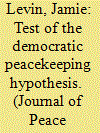

|
|
|
|
|
| Summary/Abstract |
While peacekeeping’s effects on receiving states have been studied at length, its effects on sending states have only begun to be explored. This article examines the effects of contributing peacekeepers abroad on democracy at home. Recent qualitative research has divergent findings: some find peacekeeping contributes to democratization among sending states, while others find peacekeeping entrenches illiberal or autocratic rule. To adjudicate, we build on recent quantitative work focused specifically on the incidence of coups. We ask whether sending peacekeepers abroad increases the risk of military intervention in politics at home. Drawing on selectorate theory, we expect the effect of peacekeeping on coup risk to vary by regime type. Peacekeeping brings with it new resources which can be distributed as private goods. In autocracies, often developing states where UN peacekeeping remuneration exceeds per-soldier costs, deployment produces a windfall for militaries. Emboldened by new resources, which can be distributed as private goods among the selectorate, and fearing the loss of them in the future, they may act to depose the incumbent regime. In contrast, peacekeeping will have little effect in developed democracies, which have high per-troop costs, comparatively large selectorates, and low ex-ante coup risk. Anocracies, which typically have growing selectorates, and may face distinctive international pressures to democratize, will likely experience reduced coup risk. We test these claims with data covering peacekeeping deployments, regime type, and coup risk since the end of the Cold War. Our findings confirm our theoretical expectations. These findings have implications both for how we understand the impact of participation in peacekeeping – particularly among those countries that contribute troops disproportionately in the post-Cold War era – and for the potential international determinants of domestic autocracy.
|
|
|
|
|
|
|
|
|
|
|
|
|
|
|
|
| 7 |
ID:
149357


|
|
|
|
|
|
|
|